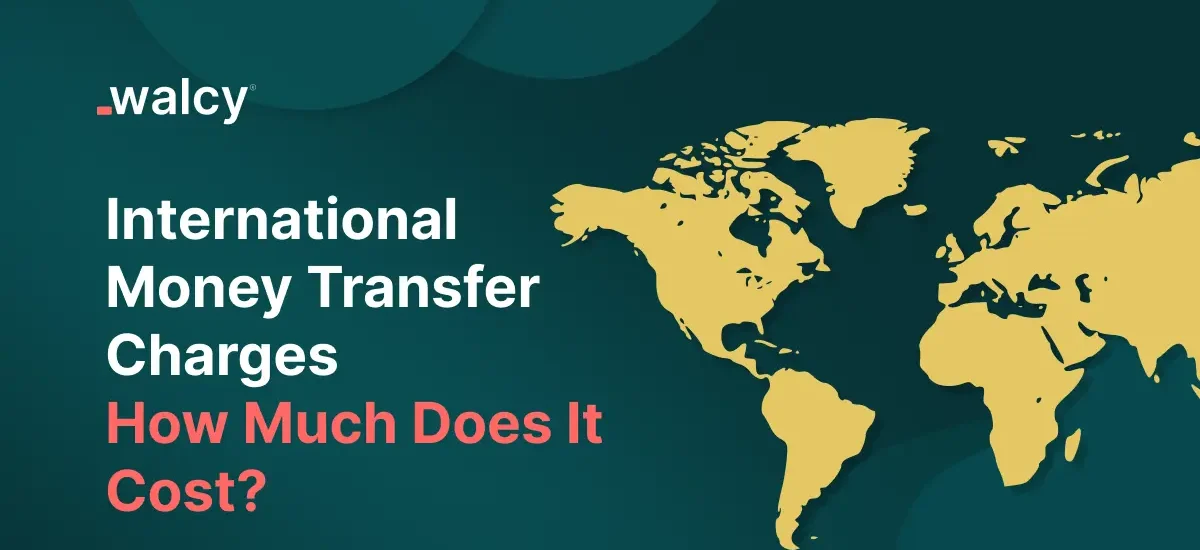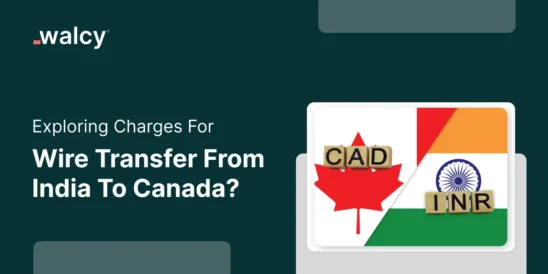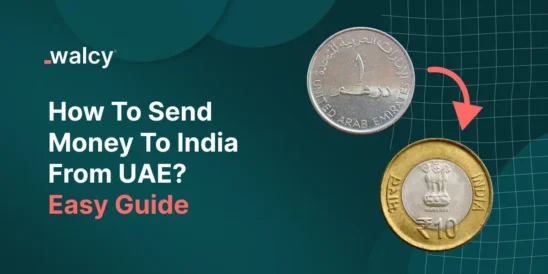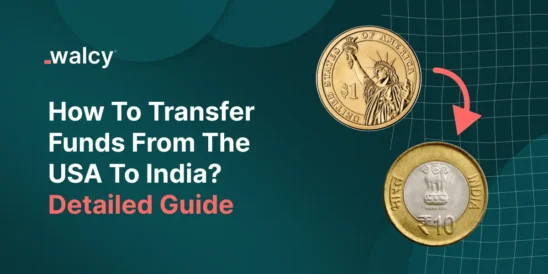Thinking of sending money to a friend or family member living abroad? Or do you own a business and need to make international transfers for various purposes like paying suppliers or vendors, sending funds for acquiring foreign companies, etc.?
Organizations or companies that operate their business internationally, need to make international transfers to manage their global activities efficiently and support their global workforce.
For whatever reasons you might be sending money, you always want to find out the best, most reliable way to send money overseas. Moreover, you would also like to know about international money transfer charges.
International wire transfer and cross-border transfer are other terms that are used interchangeably with international money transfers.
In this blog, you will find out about various transfer charges that are charged to customers for international money transfers.
What Is an International Money Transfer Charge?
Suppose you want to send money to your friend living abroad, or you want to transfer funds internationally for your business needs. For this, various intermediaries are involved to make the transaction safe and secure.
For this reason, banks and payment providers charge a certain amount of fees to their customers which covers the cost of foreign exchange, bank deductions, etc. Also, your friend who is receiving the fund overseas is charged a certain amount of fees.
All the fees one needs to pay for the transaction to get completed come under the international money transfer charge.
How Much Does It Cost to Send Money with Money Transfer Companies?
The cost of sending money using money transfer companies like Western Union and World Remit depends upon FX rates. Have you heard about the Mid-market rate?
Mid-market rate is a standard exchange rate when trading currency which is used by banks and financial institutions. Currency exchange is how money transfer companies like Western Union and World Remit make money, hence there is a markup fee applied to the exchange rate.
In your international money transfer charges, a markup fee can be one of the highest fees added. Customers might not even realize they are paying more than they need to.
For initiating international money transfers, customers might have to provide the reason they are conducting international transfers, and the customers also must comply with the rules and regulations of anti-terrorism and money laundering.
Usually, Western Union applies limits on these two accounts:
- Unverified account: Unverified account holders can send up to 3,000 USD.
- Verified account: Verified account holders can send up to 50,000 USD.
Comparing Western Union with Wise
Wise is a financial company that provides services related to international money transfer. Let us compare international money transfer fees by comparing Western Union and Wise.
- Sending Fee: Western Union charges $0.99, while Wise charges $6.42.
- Exchange rates: Wise uses a mid-market rate, whereas Western Union applies markup on the mid-market rate.
- Receiving Fee: Western Union recipients will receive €924.54 whereas, with Wise, recipients will receive €935.95.
What Makes Up The Cost Of an International Money Transfer Charge?
Foreign Exchange Rates
A Bank transfer fee includes a lot of interchangeable in the forex conversion. Remember, this is not the interbank rate because banks and other services get currency at a different price (buying/selling) to make profits.
In simple terms, it is a cross-border payment where the customer ends up paying additional currency conversion charges on a high Interbank rate for receiving money either with a fixed amount or as the cut of the total received buck. How much the sender pays and how much the beneficiary receives is determined by the rate at the time of the transaction.
SWIFT fees
Senders and receivers who use SWIFT are charged with SWIFT fees. SWIFT, an acronym for the Society for Worldwide Interbank Financial Telecommunication, offers its clients a dependable and secure global network for conducting business. The SWIFT transfer fees also depend upon your transactions. For example, transactions made from the US to Europe will generally be much less foreign transfer fees than transactions made from the US to Asia.
Below listed points are some things you need to know about SWIFT fees and how SWIFT fees are charged:
-
Outgoing fee
Depending upon the amount and the country the customer wants to initiate the transaction; the sender’s bank charges this type of fee. Several factors cost of sending money abroad factors as transfer amount, transfer destination, transfer speed, and even banks. If several banks are involved in the transaction, then each bank can charge their respective fees.
-
Incoming fee
This fee is charged by the recipient’s bank and the fee structure depends upon the bank, the amount of money being received, and the country of origin.
-
Foreign exchange fee
Suppose you and your friend live in countries where currency differs. In this case, to convert the funds you will be charged with foreign exchange fee and this fee depends upon exchange rates.
-
Tracing fee
If you have made a transaction with your friend and if in case, transaction delays happen, or if you need to track the status of payment, then, you will be charged with tracing fee by your banks (not SWIFT itself).
Read about: SWIFT Alternatives For Businesses For Crossborder Payment.
Rules on Wire Transfer Fees
State laws that may be relevant have an impact on the costs that banking institutions charge for wire transfers. Federal legislation in the United States does not specify an upper limit on wire transfer fees. A bank or credit union is obligated to disclose to you the precise amounts of any fees related to wire transfers and other charges at the time you create an account.
The fees are contingent upon the banking institution, the amount being transferred, and the destination of the funds. Fees are usually associated with sending or receiving wire transfers, and they can mount up. A financial institution that receives a wire transfer from one of your accounts may charge extra costs on top of the transfer cost you paid your bank to send the money.
Are International Transfers Secure?
Generally, international wire transfers are secure and reliable if the customer has provided accurate information about the recipient and is conducting transactions through an established bank. But, in some cases, even if the customer has provided accurate information about the beneficiary account, hackers can access the beneficiary’s account, immediately withdraw the amount, and send the fund to another account.
Below listed points below provide the situations and cases when wire transfers can be reversed:
- If hackers access the beneficiary’s account, the sender should immediately contact their bank and dispute the transaction. If in case of investigation, the fraud can be verified, the transfer may be recalled.
- In some cases, if hackers access the sender’s account and try to initiate the payment, the sender can dispute the transaction with their bank which may reverse the transaction.
- When the sender and receiver both agree to cancel the transaction, both the sender and receiver should contact their respective banks and follow the necessary procedures to cancel the transaction. The cost of sending money abroad and overseas bank transfer charges might still be charged in such cases.
Neo Banks Charge vs Traditional Banks Charge: International Money Transfer
The comparison between neo banks and traditional banks for international money transfers is given below:
- Traditional banks often charge high fees which include flat fees and percentage-based fees. The fee structure also depends on the bank the customer chooses. On the other side, neo banks generally often no additional or even zero fees for international money transfer charges.
- Neo banks are also often known for their faster banking services. While traditional banks can take up to several days to complete international payments, neo banks offer instant transfer services.
- Neo banks use real-time exchange rates and offer competitive exchange rates by using mid-market rates (average exchange rates between two currencies). Traditional banks, usually provide fewer satisfying rates to their customer as traditional banks apply their margin to the exchange rate.
- It is found that usually, traditional banks can set up fees and exchange rates which are less transparent as they have hidden charges but neo banks provide clear options about fees and exchange rates and provides high transparency throughout the international transaction process.
We can see that neo banks provide better international money transfer services by providing faster services, competitive exchange rates, high transparency, etc.
Advantage Of Neo Banks for International Wire Transfers
Often traditional banks have fixed charges for both sender and receiver and offer high exchange rates. But neo banks leverage the benefits of digital infrastructure and provide reliable and fast transactions (in the case of traditional banks, it generally takes several days) with much lower fees.
The reason neo banks offer lower fees is because they offer real-time exchange rates. So, there is transparency and the customer has a clear idea about how much their money will be converted to.
Also, Neo Bank’s applications and online platforms are designed with user experience in mind which provides a user-friendly interface that makes it easy for customers to track their international transfers.
As neo banks do not have physical branches, users can also manage and track their international transaction progress anytime without any geographical limitations.
Conclusion
All in all, international wire transfer fee varies according to the amount and geographic location of the sender and receiver. Customers need to compare different service providers to find out which provides fast, secure, and international money transfer rates for overseas transactions.
However, we can experience much lower fees, faster processing, and high transparency from the international money transfer services provided by neo banks and other fintech solutions.
Get to know about the international payment fees
Know everything about the overseas payments
Do follow us on Facebook and LinkedIn, to stay connected with us.



